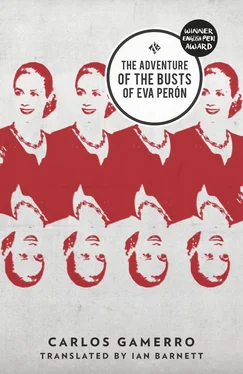Carlos Gamerro - The Adventure of the Busts of Eva Perón
Здесь есть возможность читать онлайн «Carlos Gamerro - The Adventure of the Busts of Eva Perón» весь текст электронной книги совершенно бесплатно (целиком полную версию без сокращений). В некоторых случаях можно слушать аудио, скачать через торрент в формате fb2 и присутствует краткое содержание. Год выпуска: 2015, Издательство: And Other Stories, Жанр: Современная проза, на английском языке. Описание произведения, (предисловие) а так же отзывы посетителей доступны на портале библиотеки ЛибКат.
- Название:The Adventure of the Busts of Eva Perón
- Автор:
- Издательство:And Other Stories
- Жанр:
- Год:2015
- ISBN:нет данных
- Рейтинг книги:3 / 5. Голосов: 1
-
Избранное:Добавить в избранное
- Отзывы:
-
Ваша оценка:
- 60
- 1
- 2
- 3
- 4
- 5
The Adventure of the Busts of Eva Perón: краткое содержание, описание и аннотация
Предлагаем к чтению аннотацию, описание, краткое содержание или предисловие (зависит от того, что написал сам автор книги «The Adventure of the Busts of Eva Perón»). Если вы не нашли необходимую информацию о книге — напишите в комментариях, мы постараемся отыскать её.
Carlos Gamerro's novel is a caustic and original take on Argentina's history.
The Adventure of the Busts of Eva Perón — читать онлайн бесплатно полную книгу (весь текст) целиком
Ниже представлен текст книги, разбитый по страницам. Система сохранения места последней прочитанной страницы, позволяет с удобством читать онлайн бесплатно книгу «The Adventure of the Busts of Eva Perón», без необходимости каждый раз заново искать на чём Вы остановились. Поставьте закладку, и сможете в любой момент перейти на страницу, на которой закончили чтение.
Интервал:
Закладка:
Garaguso had been acting as look-out while they were on the phone and, when the hand that was tracing windmills in the air became a pair of urgently slicing scissors, they hung up in perfect unison and settled back into the pretence with their whisky glasses. Whether it was their uncontrollable excitement or because the conditioning of assembly-line production had affected their sexual behaviour too, the workers were done quicker than it would have taken Marroné, leaving their bosses little more than the absolute minimum to organise the factory’s recovery with their allies on the outside. The problem now was that post-orgasmic relaxation, coupled with a misplaced egalitarian feeling induced in all likelihood by the promiscuous cohabitation of bourgeois and plebeian spermatozoa in the democratic innards of the transvestite and the whore, had stirred a geniality and over-familiarity in the two strikers, which their bosses, now that the objective of making contact with the outside world and setting the wheels of the rescue operation in motion had been achieved, treated with indifference and at times even disdain. Baigorria in particular, who had accompanied the whisky with an inadvisable mix of champagne, was going around hugging everyone, a situation exploited by the ever-alert Garaguso, who stuck to him like glue and continued his efforts at seduction: ‘The rate you’re going, Baigorria, your blessed revolution’s going to take how long… ten, twenty years? And who’ll pay your bills in the meantime? Fidel Castro? Who’ll buy your medicine when the kids are ill? Che Guevara? Who’ll pay for the iron your missus saw in that ad on the TV, or the dress your neighbour’s daughter wears the day you finally get round to banging her? Chairman Mao? They bang on to you about our children this, our children that, future generations the other… Life’s for living now, Baigorrita. Think about it, we’re all after the same thing: a decent life. And what do you need for a decent life? Money, Baigorrita, nothing but money. The rest is fairy tales. Now, if it’s money you need…’ The party was by now approaching the moment of maximum entropy: so drunk they could barely hold the putter between them, Viale and Espínola giggled oafishly as they tried to get a hole-in-one in the prostitute’s vagina, who, sitting on the floor with her legs spread, looked a lot like one of those weird contraptions you find at crazy-golf courses; meanwhile the sales manager, whose name Marroné hadn’t managed to jot down in his notebook, clocking the gawping mugs of Baigorria and Saturnino, shouted at them every thirty seconds ‘You two can use her to practise your pool on when we’re done!’; and the transvestite, who had swapped clothes with Sansimón and now looked like a lesbian from the 1920s, owned in a quite unprovoked fit of sincerity to being called Hugo and to doing all this to support his sick son, news that was received by all present — excepting Marroné and Saturnino — with gales of laughter, which, after a few seconds of puzzlement, Hugo himself joined in on, laughing most shrilly of all. Faring worst on the slippery slope was Sansimón himself: the combination of post-coital gloom, hangover and humiliating captivity at the hands of his own employees had wreaked havoc with his moral framework. Still got up in corset, stockings and suspenders, he fell prey to a bout of the drunken mopes and began to brood on his discontent:
‘Everything, everything… Nothing’s enough for them. They always want more. They start with the soap in the toilets and, when you agree, they want you to bend over and pick it up as well. You hold out your hand and they take your arm. Arm my foot! Shoulder. Neck. Head. And then they want more. More and more. So here you are. Yours for the taking. Eh? What are you waiting for?’
Finally cottoning on, Baigorria and Saturnino slowly turned their heads — Saturnino from gazing on his invisible member lost in the cavernous depths of the hooker’s throat, Baigorria from the insidious drip of Garaguso’s words in his ear.
Legs akimbo, grazing the carpet with the crown of his head, Sansimón pulled apart his hairy buttocks, separated by the narrow strip of panty fabric. In his inverted face his mouth opened and closed like the giant eye of a Cyclops:
‘You want my arse? Here it is! Roll up! Roll up! First the union delegates, then the shop stewards, then health and safety, then hygiene! Then the union lawyer! And all the members! And while we’re at it, everyone that’s been fired for labour or political reasons since ’55! Will you be happy then? Will you let me do my job in peace?’
He had dropped to his knees, head between his elbows, keeping his arse up high. To spare himself the rest of this sorry spectacle, Marroné grabbed his folded jacket and briefcase, and left the office without so much as a goodbye to those who wouldn’t notice his absence anyway.
As he stepped into the corridor, he was enfolded by the hot, slightly gelatinous summer-night air and, in a matter of seconds, his face was moist with sweat. The windows were all open to let in the breeze (the air-conditioning had doubtless been turned off by the strikers on an egalitarian whim that for some reason excluded the management) and, rolling up his sleeves and undoing a couple of buttons on his shirt, Marroné went over to a window that overlooked the garden and the street beyond.
The front garden was coated in the plaster dust produced by the factory’s round-the-clock schedule, and in the moonlight the talcum-powder paths, silver trees, wax flowers and flour-dusted lawn conjured what the landscape would look like if there were life on the Moon. Here and there, their light made all the brighter by the surrounding pallor, burnt the bonfires of the worker guards, and, as if riding the soft breeze, now and then there came the sound of voices, the occasional burst of laughter, the ham-fisted but resolute picking of a guitar against the rich chorus of frogs and crickets, which had surely turned albino to survive in this white-hued world. All of a sudden the pastoral calm was shattered by the sound of sirens, and the faint whiteness beyond the main gate was filled with a blinding blue haze. Half a dozen patrol cars, their headlights blazing, had pulled up en masse and, before taking up position, six or seven uniformed officers and another two or three in plain clothes had leapt out. For a second Marroné thought they would attack straightaway, but his hope soon died. Perfectly synchronised, black-helmeted strikers came running from all directions, the moonlight glinting on the metal of their drawn guns. Police and strikers spread out, facing each other in a precarious stand-off, with nothing between them but the flimsy wire fence — the police, for the time being, going through the motions with no other purpose than to show their faces and intimidate; the workers letting them know the factory wouldn’t be retaken without a fight.
Marroné looked at his watch: it was quarter past four in the morning, and it occurred to him he might be able to find a phone and call his wife to reassure her and ask her to let the company know his whereabouts; but, anticipating just such an eventuality, as they had everything else, the strikers had locked all the offices except the main one, where the office workers captured at the start of the occupation were sleeping, guarded by two other commissars. After asking him where he’d come from and accepting his hushed explanation, one of the guards told him to find somewhere to lie down.
There were twenty odd people in the room and, despite the ample space available to them, they lay huddled on the carpet, the men in one group, the women in another, like sea lions on a beach, their heads resting on rolled-up jackets, imitation-leather cushions or even stacks of files. On several desks were scattered the leftovers of a frugal dinner: the ubiquitous ham and cheese rolls, many of them half-eaten, empty pop bottles, cellophane wrappers and bits of foil from biscuits and sweets, little plastic cups half-full of coffee and sodden dog-ends. The air-conditioning was off here as well, and as the windows looked inwards to the shop floor, the night breeze was even feebler than in the corridor, and the faces he could make out were sweating in their sleep. The more daring of the menfolk were sleeping in their vests, someone was snoring, a portable radio crackled into a slumbering ear and there was an acrid smell of cigarettes, sweat and sit-in.
Читать дальшеИнтервал:
Закладка:
Похожие книги на «The Adventure of the Busts of Eva Perón»
Представляем Вашему вниманию похожие книги на «The Adventure of the Busts of Eva Perón» списком для выбора. Мы отобрали схожую по названию и смыслу литературу в надежде предоставить читателям больше вариантов отыскать новые, интересные, ещё непрочитанные произведения.
Обсуждение, отзывы о книге «The Adventure of the Busts of Eva Perón» и просто собственные мнения читателей. Оставьте ваши комментарии, напишите, что Вы думаете о произведении, его смысле или главных героях. Укажите что конкретно понравилось, а что нет, и почему Вы так считаете.











